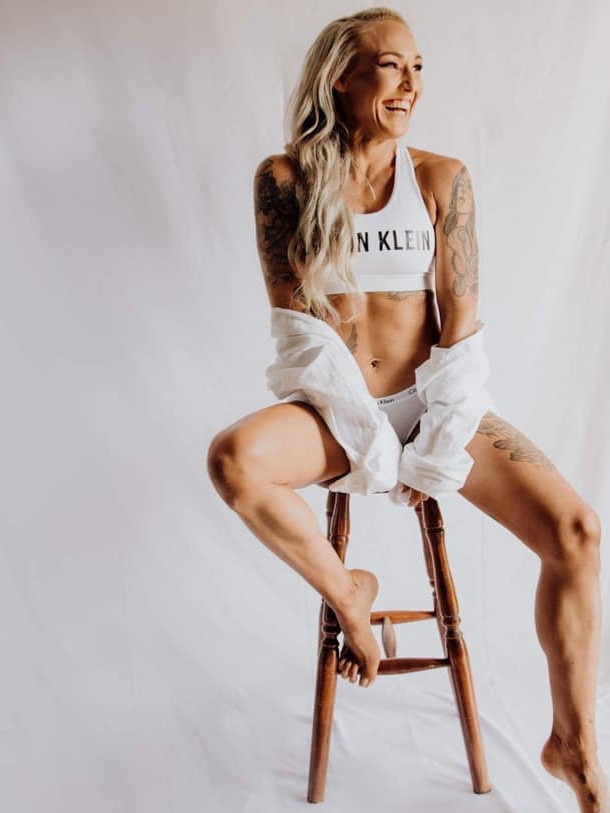‘Absolute hell’: How inspiring trainer survived rock bottom
An inspiring and successful woman who now runs her own fitness business has shared how she overcame her severe eating disorder which was declared one of the worst in Australia. WARNING – GRAPHIC CONTENT
Few people truly understand the meaning of ‘hitting rock bottom’ but Maddie Mortimer is the exception after a severe eating disorder which was declared one of the worst in Australia.
After recovering from the condition which she battled for her entire teenage life, Ms Mortimer, 34, found herself struggling with homelessness and drug addiction, after an unfathomable event.
Aged just 13 when she was first hospitalised with Anorexia in the early 2000s, the teen’s relationship with her body and food changed after a traumatic incident left her reeling and seeking a coping-mechanism as some way to regain control.
“When it comes to any self harming behaviour, it’s all about control and often brought on by some kind of trauma,” Ms Mortimer said.
“You can’t control what happened to you, but you can control this.”
It wasn’t until one tearful plea from her dad that Ms Mortimer was rushed to the Mater Children’s Hospital where she would be readmitted multiple times throughout the next five years.
Weighing just 28kg at the age of 17, Ms Mortimer was told by specialists she was “one of the three worst cases in the country” at the time and sadly the other two people did not survive.
With her 18th birthday approaching, Ms Mortimer’s parents were given two options – admit their daughter to an adult psychiatric ward or take her home.

“They said there was a high chance I would die and that almost happened,” she said.
“My eating disorder became like a second voice in my head – I wasn’t hearing things, it was my own thoughts, but it felt like a separate identity – I actually started calling her Anna.
“The more malnourished I became the stronger and louder that voice became.”
Ms Mortimer’s parents brought their daughter home to support her long recovery, and Ms Mortimer’s eating and exercise rituals became more intense.
“As hard as my illness was, my recovery was a lot harder because I went from being a 13-year-old to an 18-year-old who could go buy alcohol and go out to night clubs with her friends, but there was no emotional development in between,” she said.
“When you’re admitted to hospital they take away your way of coping, so you end up trying someone else’s.”
Despite overcoming her eating disorder in her 20s, Ms Mortimer’s life was once again turned upside down when her father heartbreakingly took his own life.
Desperate for relief from the pain she was feeling, she turned to drugs and battled a methamphetamine addiction for two years, and struggled with homelessness.
Committed to turning her life around and starting fresh, Ms Mortimer gave up drugs and relocated to Goondiwindi in 2017.

Now a mum of one, Ms Mortimer runs her own business Functional Fat Loss which offers nutrition and training plans, as well as wellness events and NDIS programs.
With a focus on helping people to adopt healthier lifestyles, eating and exercise regimes, Ms Mortimer’s business now serves more than 50 clients.
The 34-year-old said her advice to loved ones who knew of someone struggling with an eating disorder, was to remain calm, understanding and supportive.
“I get asked all the time ‘how did you get from there to here’ and I honestly don’t know because I had to rebuild from the absolute bottom of the barrel,” Ms Mortimer said.
“Climbing out of those two holes felt like absolute hell … it feels like you’re sitting at the bottom of a mountain but it’s so big you don’t know where to start, but you just have to take baby steps.
“In some ways I’m angry because those experiences destroyed a big part of my life and I did miss out on a lot of (my childhood and teenagehood) but I also gained a lot of awareness and empathy and now my story can help others.
“I think my dad would be very proud of me now.”
Professionals offer insights into eating disorders
More than one million Australians will experience or live with an eating disorder with national statistics revealing binge eating, bulimia and anorexia nervosa are among some of the most common conditions.
According to Eating Disorders Queensland (EDQ), the estimated prevalence data for the Darling Downs and West Moreton PHN was 3.83 per cent in 2019.
The region falls just behind the Gold Coast at 3.98 per cent, Brisbane South at 4.11 per cent and Brisbane North at 4.14 per cent.
Data also showed a rise in people reaching out to the organisation for assistance with eating disorders during the height of Covid-19 with the added pressures of isolation, support network reduction and feelings of loss of control.
EDQ treatment services team leader Emma Trappett said eating disorders were a serious and complex issue involving strong medical and psychological components.
She said while there is not one specific cause, several factors could cause an individual to become more at risk of developing an eating disorder including genetics and peer pressure, among others.
Up to 97 per cent of individuals struggling with an eating disorder will also experience anxiety, depression, trauma, substance abuse or other mental health challenges.
“Eating disorders have the highest mortality rate of any mental illness, however it is important to know that recovery is possible,” Ms Trappett said.
“Eating disorders often have co-occurring mental health presentations, a transdiagnostic interplay between mental health concerns (which) is why it is very important to explore factors such as trauma to look at a possible root of concerns.”
Butterfly Foundation clinical and operations lead Chris Fowler said the organisation’s helpline had received an increase in calls by 263 per cent in the past five years and reaches more than 20,000 people annually.
Sixteen per cent of helpline contacts were made from Queensland between July 2019 to June 2022 with 32.1 per cent of young Queenslanders reporting higher levels of body dissatisfaction compared to the national response of 29.7 per cent.
Mr Fowler said while eating disorders did not discriminate, research showed women and girls were “disproportionately impacted” and made up nearly 63 per cent of Australians impacted by eating disorders.
He said members of the LGBTIQA+ community also experienced greater incidents of disordered eating, as well as more severe symptoms, while two thirds of young trans people had reported limiting their eating because of their gender identity.
Over one third of presentations are male but Mr Fowler said this number would be higher if more men came forward for help.
“While it is difficult to pinpoint exactly how the nature of eating disorders has changed over the past decade, it is heartening to see that more people are willing to speak up about their experiences and share the true reality of these complex mental illnesses,” Mr Fowler said.
“Previous misconceptions that you have to ‘look’ or be ‘sick enough’ to have an eating disorder are slowly being reduced.”
Despite atypical anorexia being as or more common than typical anorexia, the condition was only officially stated as an eating disorder diagnosis in 2013.
Mr Fowler said the condition met all the same criteria points as typical anorexia, except the individual’s weight was within or above a normal range.
“A further study found that people with atypical anorexia were just as emotionally distressed and physically compromised as those with typical anorexia, with another study finding that distress related to eating and body image was more severe in people with atypical anorexia,” he said.
“Binge eating disorder also only became a distinct, diagnosable eating disorder in 2013, yet today it is Australia’s most common eating disorder.
“These changes highlight more diverse experiences of eating disorders are being recognised, and we must encourage general society and health professionals to rethink their perception of eating disorders to continue reducing stigma and shame.”
Mr Fowler said while social media did not cause eating disorders, is could contribute by promoting harmful beauty and body ideals, fatphobia, diet culture and misinformation surrounding health and wellness.
“Previously, this rhetoric was only available through mainstream media like magazines, but now, it’s available 24/7 in the palm of your hand,” he said.
“We urgently need to combat this and ensure the next generation is equipped with the skills, resilience and knowledge to support a positive body image.”
The foundation’s Body Kind Youth study surveyed more than 1600 young Australians and revealed nearly half of them said social media made them feel dissatisfied with their bodies.
While without social media, 90 per cent of young people surveyed still had “concerns about their body”.
Loved ones who are concerned someone they know is struggling with an eating disorder or body image concerns are encouraged to address the issue in a compassionate way before seeking medical and psychological advice from a GP and other professionals on how to proceed.
Early intervention is also encouraged as it can have a significant difference on the severity and duration of an eating disorder.
Both Eating Disorders Queensland and the Butterfly Foundation provide support and treatment options to individuals and families impacted by eating disorders.
If you have been impacted or need someone to speak to, please contact the Butterfly Foundation by phoning 1800 33 4673 or Eating Disorders Queensland by phoning 3844 6055.
More Coverage
Originally published as ‘Absolute hell’: How inspiring trainer survived rock bottom





